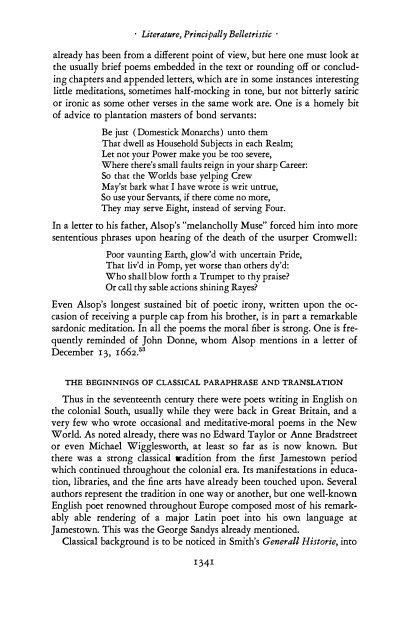Literature, Principally Belletristic - University of Tennessee, Knoxville
Literature, Principally Belletristic - University of Tennessee, Knoxville
Literature, Principally Belletristic - University of Tennessee, Knoxville
Create successful ePaper yourself
Turn your PDF publications into a flip-book with our unique Google optimized e-Paper software.
· <strong>Literature</strong>, <strong>Principally</strong> <strong>Belletristic</strong> .<br />
already has been from a different point <strong>of</strong> view, but here one must look at<br />
the usually brief poems embedded in the text or rounding <strong>of</strong>f or conclud<br />
ing chapters and appended letters, which are in some instances interesting<br />
little meditations, sometimes half-mocking in tone, but not bitterly satiric<br />
or ironic as some other verses in the same work are. One is a homely bit<br />
<strong>of</strong> advice to plantation masters <strong>of</strong> bond servants:<br />
Be just (Domestick Monarchs ) untO them<br />
That dwell as Household Subjects in each Realm;<br />
Let not your Power make you be too severe,<br />
Where there's small faults reign in your sharp Career:<br />
So that the Worlds base yelping Crew<br />
May'st bark what I have wrote is writ untrue,<br />
So use your Servants, if there come no more,<br />
They may serve Eight, instead <strong>of</strong> serving Four.<br />
In a letter to his father, Alsop's "melancholly Muse" forced him into more<br />
sententious phrases upon hearing <strong>of</strong> the death <strong>of</strong> the usurper Cromwell:<br />
Poor vaunting Earth, glow'd with uncertain Pride,<br />
That liv'd in Pomp, yet worse than others dy'd:<br />
Who shall blow forth a Trumpet to thy praise?<br />
Or call thy sable actions shining Rayes?<br />
Even Alsop's longest sustained bit <strong>of</strong> poetic irony, written upon the oc<br />
casion <strong>of</strong> receiving a purple cap from his brother, is in part a remarkable<br />
sardonic meditation. In all the poems the moral fiber is strong. One is fre<br />
quently reminded <strong>of</strong> John Donne, whom Alsop mentions in a letter <strong>of</strong><br />
December 1 3, 1662.53<br />
THE BEGINNINGS OF CLASSICAL PARAPHRASE AND TRANSLATION<br />
Thus in the seventeenth century there were poets writing in English on<br />
the colonial South, usually while they were back in Great Britain, and a<br />
very few who wrote occasional and meditative-moral poems in the New<br />
Wodd. As noted already, there was no Edward Taylor or Anne Bradstreet<br />
or even Michael Wigglesworth, at least so far as is now known. But<br />
there was a strong classical tradition from the first Jamestown period<br />
which continued throughout the colonial era. Its manifestations in educa<br />
tion, libraries, and the fine arts have already been touched upon. Several<br />
authors represent the tradition in one way or another, but one well-known<br />
English poet renowned throughout Europe composed most <strong>of</strong> his remark<br />
ably able rendering <strong>of</strong> a major Latin poet into his own language at<br />
Jamestown. This was the George Sandys already mentioned.<br />
Classical background is to be noticed in Smith's GeneraU Historie, into<br />
1 341















